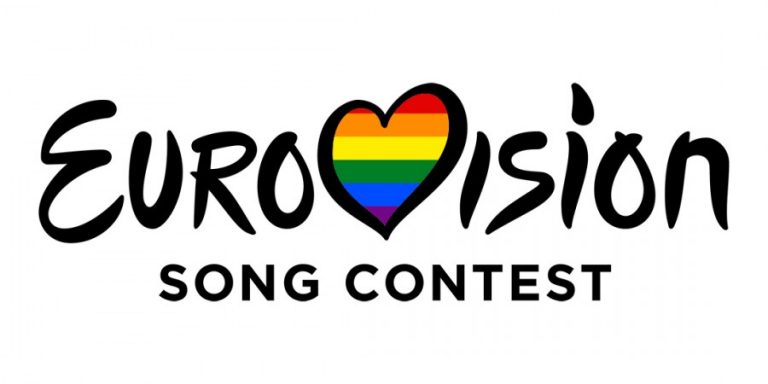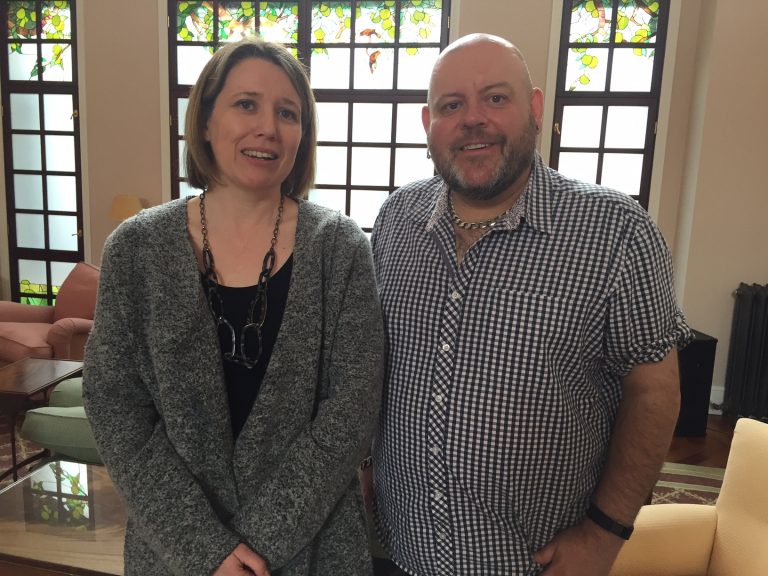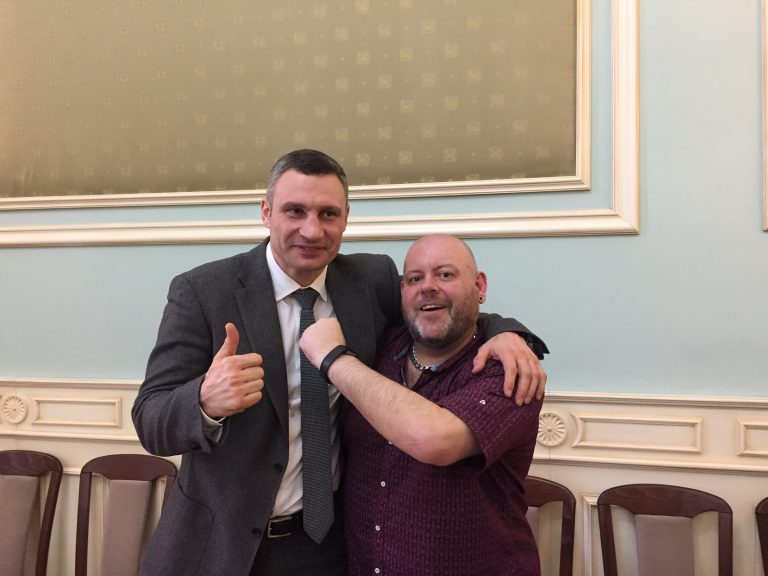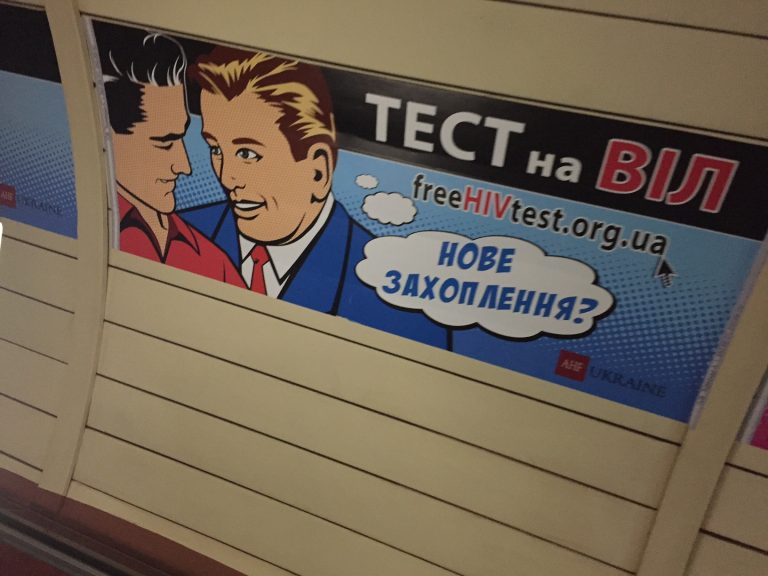Our CEO Monty Moncrieff recently visited Kyiv, and found out more about LGBT equality in Ukraine ahead of their hosting this year's Eurovision Song Contest.
For those who know me, or follow me on Twitter, it won’t have escaped your attention that I’m a huge fan of the Eurovision Song Contest. It’s a year-round hobby (some may say obsession) as I engage with many fan events, which play an important role in my social life when I’m not working on LGBT equality. Occasionally these two passions align, as they did when I was invited to this year’s host city Kyiv earlier this year, and given the opportunity to meet with local LGBT activists. Here’s what I learned.

Eurovision has long connected with the LGBT audience, and in ways beyond the superficial camp spectacle of the TV show. As early as 1961 the winning song Nous Les Amoureux follows a long tradition of coded meaning with a gay interpretation of a tale of forbidden love. LGBT people are not merely spectators at Eurovision, we’re there front and centre, celebrated on stage, and successful in winners like trans woman Dana International, drag queen Conchita Wurst, and our very own most recent UK winner Katrina, from And The Waves.
LGBT rights have become an important subplot in the Eurovision story, which despite its intention to be an apolitical event has long had small-p geo-social politics written through it like a stick of rock. Finland’s 2013 entrant Krista Siegfrid’s performance of Marry Me closed with her kissing her bridesmaid, a comment on her opposition to her country’s then lack of progress on same-sex marriage. Vienna welcomed visiting fans with same-sex couples on traffic lights, a playful gimmick that was later adopted in other world cities. Sweden has included risqué in-jokes in their presenters’ scripts as a nod to the large number of gay men in the audience.
Escaping the Soviet shadow
Since the dissolution of the Soviet Union and Yugoslavia, many recently independent nations have jumped on the Eurovision bandwagon with glee, and their efforts have been richly rewarded. Since the turn of the millennium we’ve seen victories for Latvia, Estonia, Ukraine, Serbia, Russia and Azerbaijan, and as the prize comes with hosting rights we’ve travelled to these countries the following year. This has often raised concerns for the safety of the many LGBT fans who travel to the event each year, and thrown the host country’s LGBT rights record under the microscope, as it does again with a return visit to Ukraine. I'm particularly interested in finding out more about the situation there, as I lived in the former Soviet Union as a student, something I've previously written about here.
Understanding the situation for LGBT people in Ukraine requires some knowledge of the recent history of the country. Emerging from the former Soviet Union the country has struggled with internal conflict and external image, and remains in some ways under the shadow of their Russian neighbour. Religion, banned under Communism, and nationalism are resurgent in some areas, and present considerable challenges to those seeking to shift their country towards Europe and more tolerant values. The Maidan Revolution brought a bloody stand-off between the pro-Russian Government and those seeking a more liberal future, and my Ukrainian hosts tell me there’s a sense of renewed energy in Ukrainian civil society following it.
Global events like the Euro 2012 football tournament and Eurovision offer an opportunity for nation-branding, and to present a fresh image to the watching world. When I asked locals and the organisers of this year’s Contest whether a second go at hosting is more important than the first, they’re all unanimous. It’s much bigger this time around than it was for them in 2005. There are opportunities to be grasped.
 Those opportunities were a key consideration in the planning of this year’s Kyiv Pride. At a roundtable with local LGBT activists organised by our hosts at the British Council in Ukraine they tell me they first thought about coinciding their events with Eurovision, though this was later rejected and Pride will take place in Kyiv in June. Last year their Equality March took place for only the third time following years of cancellations and opposition by the authorities. It was again subject to threats of violence in advance from far-right thugs, and attracted some protest on the day, but was also the first to pass without major incident.
Those opportunities were a key consideration in the planning of this year’s Kyiv Pride. At a roundtable with local LGBT activists organised by our hosts at the British Council in Ukraine they tell me they first thought about coinciding their events with Eurovision, though this was later rejected and Pride will take place in Kyiv in June. Last year their Equality March took place for only the third time following years of cancellations and opposition by the authorities. It was again subject to threats of violence in advance from far-right thugs, and attracted some protest on the day, but was also the first to pass without major incident.
The risk of aggression, intimidation and violence sadly remain a reality for many LGBT people in Ukraine, in a social atmosphere where LGBT issues are poorly understood by the population as a whole, and which contributes to fears about coming out or being visible. 5000 police and 1200 special forces were on hand to provide security for 2016’s March, a 30-minute event in the city centre. They dwarfed the 1500 or so participants (who were shuttled to a secret dispersal point out of the city afterwards to avoid the risk of attacks posed by ultra-nationalist groups), but policing in favour of Pride participants is a huge step forward here after so many aborted attempts to march. The March attracted the support of 7 MPs and a largely positive response in the media. It’s small but important progress for local activists, but balanced with the sobering reflection that participants were urged not to wear clothing that could be easily flammable, in case of a violent attack.
Small legislative steps forward
Pride is an important event for its symbolism and visibility as well as its ability to act as a catalyst for change. Kyiv Pride is classed as a priority event for ILGA Europe to support, who rank Ukraine woefully low in their Rainbow Europe Index. Scoring just 13% on LGBT Equality Ukraine sits marginally ahead of Azerbaijan (last at 5%), Armenia and Russia (7% each) and Turkey (9%). Same sex relationships are legal, with an equal age of consent at 16, but partnerships still have no legal recognition. Access to healthcare to transition and legal gender change has been possible since 1992, though assessments for treatment come with significant and discriminatory barriers, with surgery only permissible for over 25s. (The gay activists I meet tell me there’s only a handful of visible trans activists, with most people opting to transition and live in ‘stealth’.) An important Directive in 2015 brought protections in the workplace, but legal advances remain few and far between.
Culturally there are some advances, with two prominent LGBT clubs in Kyiv, though little in other areas. The Kyiv Film Festival has had an LGBT sub-programme for 15 years. And I’m struck by the optimism of the activists I meet. They tell me that most young Ukrainians would not have a problem with LGBT people, and in fact most of the population is probably quietly tolerant of private relationships, but say most people simply don’t know how to talk about LGBT issues. Where they are discussed publicly it can be to stoke fear, for example claiming that closer alignment with the EU would force Ukraine to adopt same-sex marriage. Although I know how much more we’ve achieved in LGBT equality here in the UK, I’m immediately reminded of the way our identities were used to stoke fear here by those opposed to marriage equality just a few short years ago. The arguments our opponents use against us are the same the world over – perhaps we’re only a few short steps further down the road ourselves?
International support

The push for LGBT equality needs to come from many places, and just like in the UK it needs to bring others along with it. One place it’s being backed in Ukraine is through the UK Embassy. The current Ambassador to Ukraine, Judith Gough, is an out lesbian living with her partner and their children. I was invited to a breakfast meeting at her residence, and I get the impression she takes satisfaction in quietly challenging the stereotypes about her, and LGBT people more broadly. Just by turning up to events with her partner challenges perspectives on a small level (though she also challenges the perspectives in our visiting party of what an Ambassador 'should' be like with the revelation she was a regular at the Royal Vauxhall Tavern when she lived in London.) She’s also a huge Eurovision fan and is excited about the possibilities of the circus coming to town.
Gough is not just turning up and glad-handing officials though: she tells us about the work her office does with local LGBT activists and NGOs, along with the British Council. The UK Government has pledged to promote LGBT equality internationally and in Ukraine we see some clear examples of this happening on a very local level. It’s a reminder of the role external players (Governments, NGOs, human rights organisations) can play through engaging sensitively on the ground with local activists, learning from them and building their own capacity to work for change.
 There’s a way to go though, and much progress to be made. We’re granted a meeting with the Kyiv city authorities to discuss their plans ahead of Eurovison, and it turns out to be at the very top of the office with the Mayor, Vitali Klitschko, the former boxer whose brother just suffered defeat in London to Anthony Joshua. He’s a huge, imposing figure, and it feels slightly surreal to be discussing LGBT issues with him. I ask whether the city has similarly invested in building the capacity of civil society groups like Kyiv Pride as the UK institutions have done. The question is met with bemused faces. This approach, so crucial in how central and local governments work with the voluntary sector in the UK, clearly just hasn’t even been considered.
There’s a way to go though, and much progress to be made. We’re granted a meeting with the Kyiv city authorities to discuss their plans ahead of Eurovison, and it turns out to be at the very top of the office with the Mayor, Vitali Klitschko, the former boxer whose brother just suffered defeat in London to Anthony Joshua. He’s a huge, imposing figure, and it feels slightly surreal to be discussing LGBT issues with him. I ask whether the city has similarly invested in building the capacity of civil society groups like Kyiv Pride as the UK institutions have done. The question is met with bemused faces. This approach, so crucial in how central and local governments work with the voluntary sector in the UK, clearly just hasn’t even been considered.
'Celebrate Diversity'
The slogan for this year’s Eurovison is ‘Celebrate Diversity’ and throughout our conversations with the Kyiv authorities it’s clear that their thinking on diversity focuses on ethnic and religious difference. As we press our questions about how LGBT fans will be welcomed – and protected – they’re at pains to stress how all visitors to Ukraine will be welcome (and knowing the Ukrainian people’s reputation for hospitality I have no doubt this will be the case) but the sense that LGBT people often seek specific assurances about their safety just isn’t yet there. (The UK Embassy is acutely aware of this and has published information for those travelling to the Contest, with Kyiv Pride publishing a map of LGBT friendly places.)

There are further signs of progress though, sometimes in unlikely places. As we descend into the grandeur of Kyiv's Metro system a huge public health campaign for HIV is advertised along the escalator, depicting mixed- and same-sex couples. The ads encourage testing when starting a new relationship, and offer a free testing service. Our hosts tell us they've been subject to criticism, but importantly they're there and hugely visible., playing a small part in normalising same-sex relationships.
I’m left with an impression of Ukraine being at a crossroads. Like its geographical position, it’s influenced by both east and west; the European Union and Russia; tolerance and conservatism; collective European identity and nationalism. The latter remains a significant threat to LGBT people, with the very real threat of violence to those open about their identity and working to gain LGBT rights, and in countering those campaigns with oppressive voices. The social shift that was so crucial to boosting support for LGBT people and equality achieved here in the UK has yet to happen in Ukraine.
The spectacle of Eurovision will bring a brief spotlight on Ukraine, and the opportunity to use the Contest as a prism to view the record on LGBT and other human rights. NGOs working internationally can use this to focus attention (as with Serbia, Russia and Azerbaijan during their hosting tenure) though it’s crucial to maintain pressure as the show rolls out of town again. As individuals we can pledge our own support to the dedication and energy of local LGBT people and groups, showing solidarity and understanding of their work, and apply pressure on our own Government to improve support for LGBT equality worldwide.
Monty
Links to Ukrainian LGBT groups
Disclaimer: My trip to Kyiv was in a personal capacity, not as a representative of London Friend. I travelled as a representative of OGAE UK, the UK’s Eurovision Fan Club. The trip was organised by the British Council and UK Embassy in Ukraine through the GREAT Britain fund.
